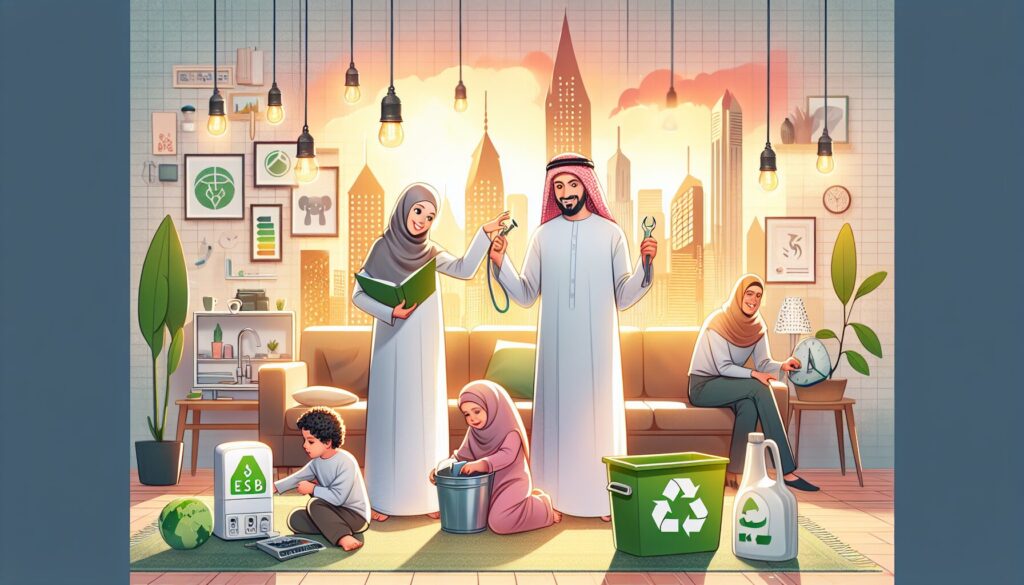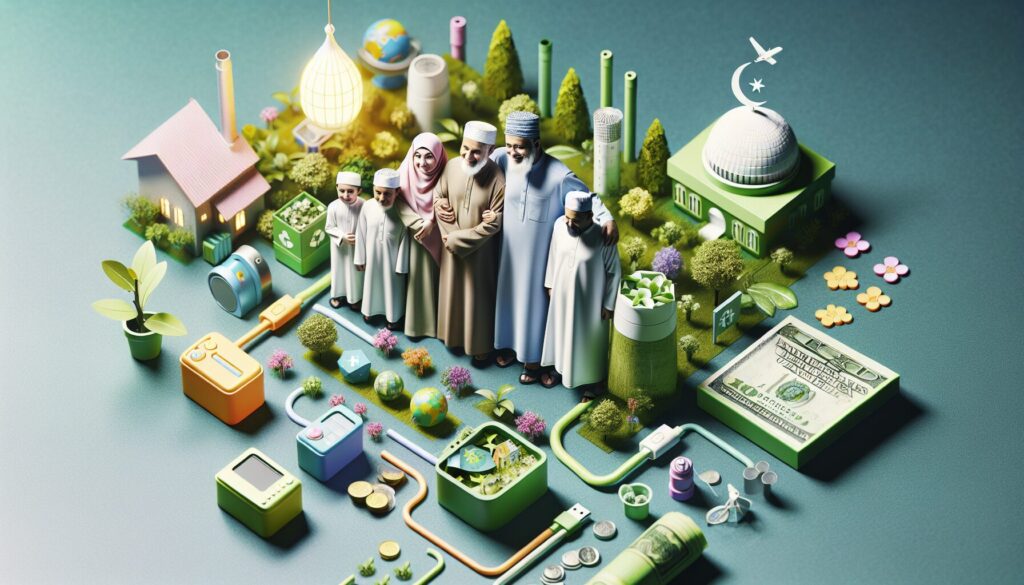Hey there! Have you ever felt that little tug at your heart when you see a plastic bottle floating in a river or a forest being cut down? I sure have. I remember a camping trip with my family, sitting by a pristine lake. We were soaking in the beauty of nature, but then I noticed some litter nearby. That moment made me think deeply about how our everyday choices impact the planet. As a Muslim, it connected directly to the responsibility we are given as stewards (khalifah) of the Earth. Sustainable living is all about making choices that help protect our environment, like opting for reusable bags or conserving water. It’s not just about big gestures; small, consistent steps can lead to significant changes. So, why not start exploring this lifestyle today and be part of something wonderful?
⚠️ A Quick Safety Note
When implementing sustainable practices at home, ensure proper ventilation when using natural cleaning products to avoid respiratory irritation. Additionally, exercise caution when installing energy-efficient appliances or systems to prevent electrical hazards.
Energy Efficiency: How to Reduce Consumption

Start by considering how you use energy in your home every day. It can be eye-opening to realize just how much we rely on electricity and gas without even thinking about it. From turning on the lights to charging our gadgets, every little bit adds up. So, it’s essential to be smart and intentional about cutting down on energy consumption. Not only will it help the planet, but it’ll also put some extra cash back in your pocket.
Quick Wins for Energy Efficiency
There are simple changes you can make right now to reduce energy use:
- LED Bulbs: Swap out old incandescent bulbs for LED ones. They use a fraction of the energy and last much longer, saving you money over time.
- Smart Thermostats: Consider installing a smart thermostat. They learn your schedule and adjust temperatures automatically, ensuring you’re not wasting energy when you’re not home. Companies like Nest and Ecobee provide excellent options.
- Unplug Electronics: Many devices consume energy even when they’re off, a phenomenon known as “phantom load.” Unplugging gadgets or using power strips can help eliminate this unnecessary usage.
Another impactful step is to address insulation and sealing. Poor insulation is like leaving a window open when the air conditioner is on. It just doesn’t make sense! By sealing gaps around doors and windows, you keep the temperature stable and reduce the need for excessive heating or cooling. Look for insulation solutions provided by Energy Star, which can guide you toward more efficient options.
Investing in energy-efficient appliances can also pay off in the long run. When it’s time to replace a washing machine or refrigerator, seek out models with high energy ratings. They might cost a bit more upfront, but the savings on your utility bill can be significant. Plus, you’ll be reducing your carbon footprint, which is a win-win for everyone!
Consider renewable energy sources like solar panels. While the initial investment can be steep, the long-term benefits are substantial. Not only can they dramatically decrease your reliance on grid electricity, but they can also potentially allow you to sell excess energy back to the grid, depending on local policies. Companies such as SunPower are leaders in this field and offer a range of solutions.
Think of energy efficiency as a journey rather than a destination. Make small changes, and over time, they’ll add up to significant benefits for both your wallet and the planet. Every step counts, and your efforts contribute to a more sustainable future for all.
Every kilowatt saved is an act against wastefulness (israf), a principle strongly discouraged in the Quran. This reframes energy saving from just a financial choice to a spiritual one.
Waste Reduction: Practical Tips for Less Waste
Reducing waste at home can feel daunting at first, but trust me, it’s easier than you think! Remember the first time I tried to bake a cake for my neighbor’s potluck? I ended up with a mountain of dirty dishes and a kitchen that looked like a flour bomb went off. It reminded me how easy it is to create waste, even with the best intentions. However, over time, I’ve picked up some practical tips that can help trim down the trash while keeping your home organized and eco-friendly.
First up, let’s talk about composting. It may sound like something only hardcore gardeners do, but it’s a fantastic way to cut down on food waste. Think of it as nature’s recycling system where your kitchen scraps turn into nutrient-rich soil. Just set up a small bin in your kitchen for things like fruit peels and coffee grounds. There are compact compost bins available that fit perfectly under the sink or on a balcony, making it super convenient even for city dwellers.
Next, let’s tackle single-use plastics. These pesky items are everywhere! From grocery bags to water bottles, they seem to creep into our lives despite our best efforts. Switching to reusable bags and water bottles is a straightforward swap. Many local grocery stores offer incentives or discounts if you bring your own bags, and it’s a win-win for your pocket and the planet. Companies like Surfrider Foundation are doing fantastic work to help reduce plastic pollution, and they offer some great resources and tips for those looking to make a change.
Smart Shopping and Reusing
Shopping smartly can also significantly reduce waste. Planning meals ahead of time and creating a shopping list helps avoid impulse buys that often end up in the trash. Additionally, buying in bulk can reduce packaging waste. Just remember to bring those reusable containers! Some groceries even provide discounts if you use your own jars or bags. Check out Zero Waste Home for some creative ideas on how to shop with less waste.
Reusing items is another brilliant way to cut down on waste. Old glass jars can become chic storage containers, and worn-out t-shirts make great cleaning rags. Before throwing something away, ask yourself if it can be repurposed. This mindset shift can lead to some pretty creative and useful solutions.
Don’t forget about donating and recycling. Many communities have local centers for recycling electronics and hazardous waste, ensuring these items don’t end up in landfills. It’s also rewarding to donate gently used clothing and household items to organizations like Goodwill that can give them a second life. If you’re raising environmentally conscious children, these activities can be an excellent way to teach them about sustainability and responsibility. For more ideas on nurturing eco-friendly habits in kids, check out our guide on raising environmentally conscious children.
With these tips, you’ll be well on your way to creating a more sustainable living environment at home, one small change at a time. Remember, every little bit helps, and soon enough, you’ll see the impact of your efforts in your trash bin—because it’ll be a lot less full!
Water Conservation: Smart Strategies for Saving
Every drop counts when it comes to conserving water, and there are some nifty strategies you can adopt right at home. First things first, think about those little leaks that go unnoticed. A dripping tap might seem harmless, but over time, it can waste a significant amount of water. Start by checking all your faucets and pipes for leaks. It’s like finding hidden treasures, except you’re saving water instead of discovering gold.
Another great way to conserve water is by rethinking how you use it in your daily routines. For instance, cutting your shower time by just a minute or two can make a big difference. If you’re feeling adventurous, try a cold shower—it’s refreshing, and you’ll likely spend less time under the water. Plus, it’s a great way to wake up in the morning!
Installing water-saving devices is another smart move. Low-flow showerheads and faucet aerators are simple to install and can significantly reduce water usage without sacrificing performance. They work by mixing air with water, so you get that satisfying pressure while using less. It’s a win-win!
Gardening and Lawn Care
Let’s not forget about the garden. Your outdoor area can be a major water guzzler if you’re not careful. Consider using a rain barrel to collect rainwater for watering your plants. It’s an eco-friendly solution and plants love rainwater as much as we love a good rainstorm. Also, opt for native plants that are adapted to your local climate; they typically require less water and maintenance.
For those with lawns, think about switching to a more sustainable option like a clover lawn. Clover stays green longer and requires less mowing and water. It’s like giving your lawn a sustainable makeover!
Educate yourself and others. Organizations like Water Footprint Network and Alliance for Water Efficiency offer resources and tools to help you understand and reduce your water footprint. Engaging with these communities not only enhances your knowledge but also connects you with like-minded individuals committed to sustainable living.
By incorporating these strategies, you’ll be well on your way to a more sustainable lifestyle. Remember, every action counts, and when we all pitch in, the impact is tremendous.
This is deeply rooted in our tradition. The Prophet Muhammad (peace be upon him) taught us to conserve water, even if we are performing ablution (wudu) on the bank of a running river. Every drop we save is an act of faith.
Sustainable Home Products: Choosing Eco-Friendly Alternatives

When it comes to sustainable home products, making eco-friendly choices can really make a difference. I remember when I swapped my old cleaning supplies for greener alternatives, and it was like a lightbulb moment—literally! It felt great knowing I was helping the planet while keeping my home clean. But enough about me; let’s dive into some fantastic ways you can make your home a hub of sustainability.
First off, consider your cleaning products. Many conventional cleaners are full of harsh chemicals, but there are plenty of eco-friendly brands out there. Look for options that are biodegradable and free from synthetic fragrances. Companies like Seventh Generation and Method offer a range of products that clean effectively without harming the environment.
Next, think about your kitchen. Switching to reusable items is a small change with a big impact. Ditch single-use plastics and invest in glass or stainless steel containers. Brands like Stasher make silicone storage bags that are perfect for everyday use. They’re durable, dishwasher-safe, and keep food fresh without the waste.
Transform Your Laundry Routine
When it comes to laundry, making eco-friendly choices is easier than you might think. Start by using cold water whenever possible. It saves energy and helps your clothes last longer. For detergents, opt for plant-based options that are phosphate-free. These are gentler on the planet and your skin. Ecover offers a great line of eco-friendly laundry products that get the job done.
Don’t forget about your clothing itself! Choosing sustainable fabrics like organic cotton or bamboo can make a huge difference. These materials require less water and fewer pesticides to produce. Plus, they’re incredibly soft and comfortable.
Consider your furniture and decor. Look for pieces made from reclaimed or sustainably sourced materials. Companies like West Elm offer a variety of furniture options that are both stylish and sustainable. Opting for second-hand furniture is another great way to reduce waste and find unique pieces for your home.
Making these simple swaps can have a profound impact on your carbon footprint. Every little choice adds up, contributing to a more sustainable lifestyle. So go ahead, give it a try, and enjoy the satisfaction of living in a home that’s as kind to the planet as it is to you!
Choosing natural, non-toxic products for our homes is also a reflection of the Islamic emphasis on purity (tahara), ensuring the environment we raise our families in is clean and wholesome.
Gardening and Food: Growing Your Own and Eating Sustainably
Gardening and sustainable eating are like a breath of fresh air for your daily routine and the planet. Imagine this: a few years back, I decided to start a tiny vegetable garden on my balcony. At first, I just wanted some fresh herbs for my pasta. But soon, I found myself surrounded by lush greens and vibrant tomatoes. The taste of a homegrown tomato was like a sunburst in my mouth, and I was hooked!
Growing your own food isn’t just about the taste—it’s about making a difference. For starters, it reduces your carbon footprint. Transporting food from farms to stores involves lots of fuel and emissions. When you grow at home, you’re cutting down on this impact. Plus, home gardens can be a sanctuary, reducing stress and boosting well-being. There’s something about watching a seedling sprout that just warms the heart.
Let’s dive into some practical tips:
- Start Small: If you’re new to gardening, don’t overdo it. Begin with easy-to-grow plants like lettuce or basil.
- Use Natural Fertilizers: Compost your kitchen waste and use it to nourish your plants. It’s a sustainable way to feed your garden.
- Consider a clover lawn if you have space. It’s low maintenance and great for the environment.
Eating Sustainably
Eating sustainably is more than just a trend; it’s a lifestyle choice with profound impacts. By supporting local farmers and markets, you’re not just getting fresh produce—you’re supporting your community. Whenever possible, choose organic foods and avoid excessive packaging. Organizations like Slow Food International champion these practices, advocating for a return to traditional and sustainable cooking methods.
Moreover, reducing meat consumption can have a significant impact on our planet. Livestock farming is a major contributor to greenhouse gases. By embracing a plant-based diet, or even just having meatless Mondays, you’re making a positive change. Resources like Meatless Monday offer fantastic recipes and tips to help you get started.
Don’t forget about food waste. The Food and Agriculture Organization reports that a third of all food produced globally is wasted. Be mindful of your portions, get creative with leftovers, and compost what you can’t use. Every small action contributes to a more sustainable world.
Growing our own food is a beautiful way to connect with the concept of rizq (sustenance) from Allah and appreciate the miracle of His creation right in our own backyard.
Conclusion
To sum up, adopting sustainable practices in our daily lives is both a rewarding and essential journey, with each small step contributing to a healthier planet and a more mindful way of living. As we make conscious choices in energy efficiency, waste reduction, water conservation, and sustainable consumption, the collective impact becomes significant. By embracing these changes, we not only nurture our environment but also enrich our own lives. So, let’s continue to make thoughtful decisions and inspire others along the way. Here’s to a greener and more sustainable future!
Continue Exploring
Unlock the secrets of how nature impacts your child’s growth and happiness. Dive into the fascinating science that reveals the magical bond between kids and the great outdoors.
Frequently Asked Questions
What are some easy ways to start living more sustainably at home?
Start by making small changes such as swapping incandescent bulbs for energy-efficient LED bulbs, using smart thermostats to regulate home temperature, and unplugging electronics to prevent phantom load. Additionally, consider using reusable bags and water bottles to reduce single-use plastic waste, and start composting kitchen scraps to minimize food waste.
How can I conserve water effectively in my home?
To conserve water, check for leaks in your faucets and pipes, as even small drips can waste significant amounts of water over time. Install low-flow showerheads and faucet aerators to reduce water usage without sacrificing performance. Also, consider using a rain barrel for watering plants and opt for native plants that require less water for your garden.
What are some sustainable alternatives to traditional home products?
Switch to eco-friendly cleaning products that are biodegradable and free from synthetic fragrances. Use reusable items like glass or stainless steel containers instead of single-use plastics. For laundry, use cold water and plant-based detergents, and consider sustainable fabrics like organic cotton or bamboo for clothing. Choose furniture made from reclaimed or sustainably sourced materials.
Fatima Ansari is an Islamic educator and writer with over a decade of experience teaching Quran and Islamic studies to children and families in Western Muslim communities. Growing up in North America, she saw firsthand the challenges Muslim families face in balancing faith with modern life, which inspired her to share practical guidance rooted in the Quran and Sunnah. Her mission with E-Quran Learning is to make Islamic education accessible, relatable, and inspiring for Muslim families across the United States, United Kingdom, Canada, Australia, and New Zealand.






